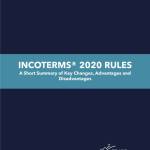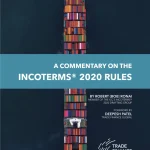Ex Works (EXW) – Incoterms® 2020 Rule
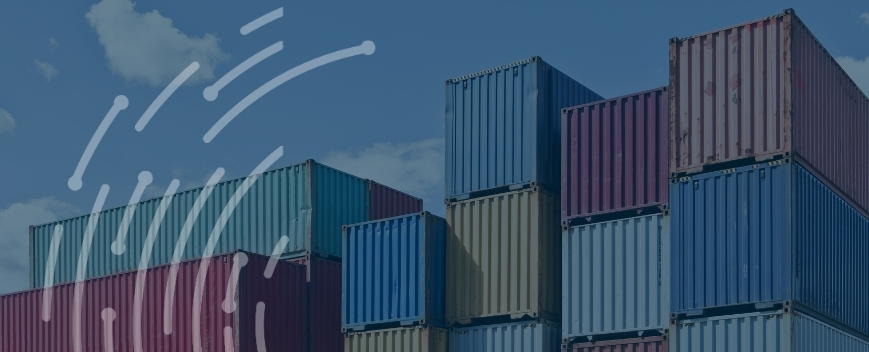
Contents
Ex Works Incoterms (EXW)
Ex Works (EXW) is the Incoterms® 2020 rule used to describe the delivery of goods by the seller at their own place of business, generally in their factory, offices or warehouse.
Ex Works Incoterm: an introduction
Ex Works (EXW) is the Incoterms® 2020 rule used to describe the delivery of goods by the seller at their own place of business, generally in their factory, offices or warehouse. Since, under EXW, the seller does not need to load items onto a truck or worry about the freight once it has left their premises, this is the most favourable term for the seller.
Once the seller has informed the buyer that the goods for the contract have been identified and set aside, then the delivery is considered to have been made. At this point, the buyer bears the risk and is obliged to pay, even though the goods may still be in the possession and physical control of the seller. Not only that, it is not the seller’s responsibility to load the goods onto the buyer’s collecting means of transport.
How would this play out in real life? Will the seller allow the buyer’s transport contractor to bring their own forklift and labour, and allow them to rampage around the seller’s warehouse? What would be the insurance, workplace safety, and other ramifications of this?
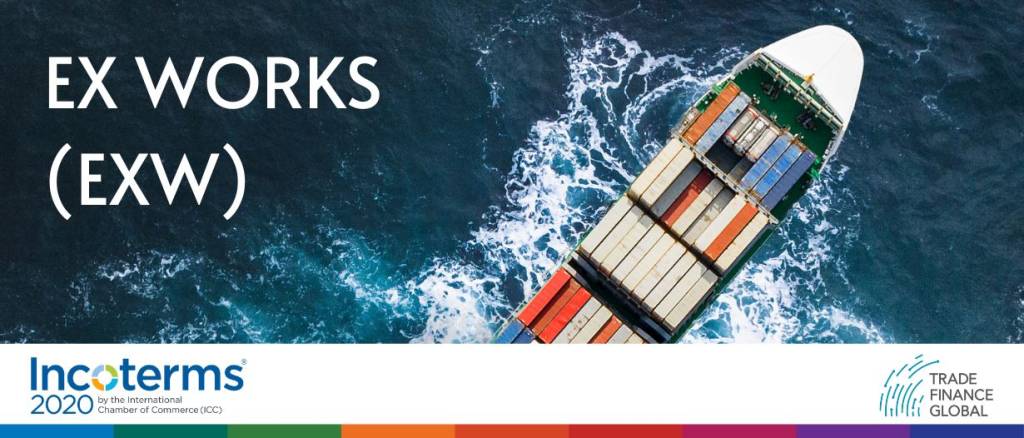
Ex Works Incoterms 2020 rule – key changes and updates
If the goods are being exported, there are more problems with EXW.
Under EXW, the buyer is responsible for clearing the goods for export. The issue is, however, that in most countries, only an entity registered in that country can export. Add to that potential VAT/GST issues because unless the seller has evidence of the export, they must charge this tax as it would be seen as a local sale.
In effect, using EXW as described in Incoterms 2020 is almost impossible.
Ex Works Podcast
Ex Works seller and buyer obligations
A1 (General obligations)
In each of the eleven rules, the seller must provide the goods and their commercial invoice as required by the contract of sale and any other evidence of conformity, such as an analysis certificate that might be relevant and specified in the contract.
Each of the rules also provides that any document can be in paper or electronic form as agreed in the contract, or if the contract makes no mention of this, then the rules default to what is customary.
The rules do not explicitly define what “electronic form” is. This ambiguity means that it can be anything from a .pdf file to a blockchain record or another format yet to be developed.
B1 (General obligations)
In each of the rules, the buyer must pay the price for the goods as stated in the contract of sale.
The rules do not refer to when the payment is to be made (e.g., before shipment, immediately after shipment, thirty days after shipment, etc.) or how it is to be paid (e.g., prepayment, against an email of copy documents, on presentation of documents to a bank under a letter of credit, etc.).
These matters should be specified in the contract.
A2 (Delivery)
Under EXW the seller “delivers” simply when the goods are placed at the disposal of the buyer at an agreed point, which is usually the seller’s own premises or somewhere like their contracted manufacturer, on the specifically agreed date (e.g., “by 31 March”) or within the agreed period (e.g., “within 90 days after contract date”).
This means that even though the goods may be simply sitting within the seller’s premises, they have already been “delivered”. The act of delivery here is not a physical handing over by a movement of the goods but a notional one achieved by the seller giving the appropriate notice to the buyer.
When the buyer arranges a collecting vehicle, whether a carrier’s vehicle or, new for the 2020 rules, the buyer’s own vehicle, to be at the named premises, the seller has no obligation to load that vehicle since, According to EXW, the buyer is responsible for loading the vehicle.
However, in most cases, the buyer loading the vehicle themselves is not practical for a number of reasons.
Most sellers, whether for insurance or safety reasons, will not allow non-employees into their facilities. The seller certainly would not allow a buyer to go rampaging around the premises in a forklift that the buyer rolled off their vehicle. Plus, to physically move goods off, say, a rack three metres up might need a specialised forklift. The seller might even use an automated picking and despatch system.
From a practical standpoint, it is usually the seller who is best placed to load the buyer’s vehicle. If this is the expectation, however, then the contract should clearly state that the seller does so at the buyer’s cost and risk. If the buyer is not prepared to take this risk, then EXW is not the appropriate rule and the parties should consider the FCA rule instead, where it is the seller’s obligation and risk to load the collecting vehicle.
If the goods are going to be at a location other than the seller’s premises, such as a contracted manufacturer, or if the seller has several places within their premises (such as numerous despatch docks), this information needs to be communicated to the buyer so their vehicle goes to the correct location. Any restrictions at the site also need to be communicated.
If, for example, the loading dock needs to be accessed through a parking lot, it might be that a forty-foot container on a trailer can not be brought close to that dock. Or perhaps the dock can only be accessed by a narrow roadway, placing restrictions on truck size. Any such conditions must be communicated to the buyer.
B2 (Delivery)
The buyer’s role in EXW is that they must take delivery when the seller has made the goods available and has given their notice of this under A10.
This usually will be when the goods are simply sitting in the seller’s premises and may well be before the buyer’s collecting vehicle arrives at the seller’s premises. The buyer should consider their exposure to risk from this point on and would be wise to ensure that they have adequate insurance cover, such as under Institute Cargo Clauses (A).
Taking all of this into consideration and it becomes clear that the delivery requirements of the EXW rule can be challenging to work with.
A3 (All Rules)
Under all of the rules, the seller bears all risks of loss or damage to the goods until they have been delivered in accordance with A2 described above. The exception is loss or damage in circumstances described in B3 below, which varies depending on the buyer’s role in B2.
B3 (All Rules)
The buyer bears all risks of loss or damage to the goods once the seller has delivered them as described in A2.
Additionally, if the buyer fails to give notice as described in B10 below and if the goods have been clearly identified as the goods described in the contract, then the buyer bears all risks of loss or damage from the agreed date or the end of the agreed period for delivery.
A4 (Carriage)
In EXW, the seller has no obligation to the buyer to arrange the carriage of the goods.
The seller, however, does have an obligation to provide the buyer with any information in its possession (including any transport-related security requirements) requested by the buyer at its risk and request.
B4 (Carriage)
The buyer must arrange for the carriage of the goods, whether by the buyer itself or a contracted carrier, at its own cost from the named place of delivery. This allows the buyer to take delivery of the goods, as might occur in a domestic transaction.
Note that as the seller in EXW is not responsible for loading the goods onto the vehicle, the buyer will bear the cost of loading, which would typically need to be added to its contract with the carrier. There is no point in the carrier’s truck turning up at the seller’s premises with no loading equipment and the seller refusing to load.
A5 (Insurance)
Since the seller does not have the risk beyond the moment of “delivery” under EXW, it has no obligation to the buyer to arrange a contract of insurance.
However, if the buyer requests information from the seller that they need to arrange its insurance, the seller must provide it, albeit at the buyer’s risk and cost. If there is any information the buyer requests that the seller does not already know, the seller can, and probably would, choose to assist.
Nevertheless (and the Incoterms® 2020 rules do not cover this), a wise seller would investigate taking out marine insurance on a contingency basis. If the goods are lost or damaged in transit, causing the buyer to refuse to pay for them, the seller will want to have a fallback of being able to claim on its own marine insurance.
B5 (Insurance)
Despite having the risk of loss or damage to the goods from the delivery point, the buyer does not have an obligation to the seller to insure the goods.
Whether the buyer chooses to insure the goods or bear the risk themselves is entirely their choice.
A6 (Delivery / Transport / Document)
Because the seller delivers when it makes the cargo available to the buyer to collect, the seller has no obligation to provide the buyer with any delivery or transport document.
B6 (Delivery / Transport / Document)
Because the buyer receives the goods from the seller, the buyer must provide the seller with appropriate evidence of having taken delivery.
The form of that evidence is a matter to be agreed upon in the contract of sale to suit both parties. It could be a signature on the seller’s copy of the invoice, the buyer’s simple receipt, a freight forwarder’s cargo receipt, or some other evidence of having taken the goods.
A7 (Export / Import clearance)
EXW is more suited to domestic transactions rather than international transactions.
In domestic transactions, the seller has no obligations as there are not likely to be any clearances required.
In international transactions under EXW, the seller has no obligation to arrange any export/transit/import clearances. However, if the buyer requests, at its own risk and cost, the seller must assist in obtaining any documents or information which relate to formalities required by the countries of export/transit/import (e.g., permits or licences; security clearance for export/transit/import; pre-shipment inspection required by the export/transit/import authorities; and any other official authorisations or approvals).
B7 (Export / Import clearance)
In domestic transactions, the buyer has no obligation to the seller as there are not likely to be any clearances required.
In international transactions, it is up to the buyer to carry out all export/transit/import formalities required by the countries concerned at their own cost.
Note the expression “it is up to” the buyer because all of these occur after EXW delivery, so if the buyer fails to do any of these, it is at its own risk as delivery has already occurred.
A8 (Checking / Packaging / Marking)
In all rules, the seller must pay the costs of any checking operations which are necessary for delivering the goods, such as checking quality, and measuring, packaging, weighing, or counting the goods.
The seller must also package the goods at its own cost unless it is usual for this particular good to be sold unpackaged, such as in the case of bulk goods.
The seller must also take into account the transport of the goods and package them appropriately unless the parties have agreed in their contract that the goods be packaged or marked in a specific manner.
B8 (Checking / Packaging / Marking)
In all rules, there is no obligation from the buyer to the seller regarding packaging and marking. There can, in practice, however, be agreed exceptions, such as when the buyer provides the seller with labels, logos, or similar.
A9 (Allocation Of Costs)
The seller must pay all costs until the goods have been delivered under A2, except any costs the buyer must pay as stated in B9.
B9 (Allocation Of Costs)
The buyer must pay all costs from the time the goods have been delivered under A2 and reimburse the seller for any costs they incurred, providing the buyer with any assistance or information the buyer needed to arrange transport, insurance, or export and import formalities.
The buyer must pay any and all duties, taxes, customs costs, and export formalities required if the goods are exported.
The buyer also must pay any additional costs incurred if they have failed to take delivery of the goods when they have been placed at their disposal or if they have failed to give the seller appropriate notice provided the seller had clearly identified the goods as being the contract goods.
A10 (Notices)
The seller must give notice to the buyer, which is needed for the buyer to take delivery of the goods.
The form of this notice should be included in the terms and conditions of the contract, detailing whether a brief email or some manner of more formal notice is agreed upon.
B10 (Notices)
If the parties agree that the buyer is entitled to nominate a place of delivery within the named place or the time within any agreed period, the buyer must give the seller sufficient notice.
This means, for example, that if the agreed delivery place is a large bulk storage facility, the buyer may nominate a particular area outside a restricted zone in which it is allowed to operate its own equipment with its own personnel so that it can load its vehicle.
It also means, for example, where the delivery period is a particular calendar month, and the buyer wants to take delivery on the 17th day of that month, the buyer must give sufficient notice of this to the seller.
Both such matters would usually be detailed in the sales contract.
Ex Works (EXW): advantages and disadvantages
The first version of EXW came into force in the original Incoterms® 1936 and included in its heading “Ex-factory, ex-mill, explantation, ex-warehouse etc” in the English section of that book with German and French translations included in the book. Its origin in common use goes back long before that.
All advantages would seem to be to the seller, as they only need to shout (or email) “come and get ‘em” or words to that effect.
However, if the sales contract is not well-drafted, while the seller might be expecting the buyer to export the goods to an overseas market, it could find that the buyer is unable to complete export formalities and subsequently tries to reduce its potential losses by selling the goods into the seller’s home market at a discounted price.
It would also seem at first glance that the buyer is disadvantaged by having to take all risks and arrange and pay for everything.
Assuming that the buyer is in a good position to do so, then it would likely find that it can arrange all transport and formalities at the same costs as the seller would otherwise offer, but without the buyer needing to pay the seller any markup on these costs. Another possibility is that the buyer is buying goods not only from one seller but a number of sellers and chooses to accumulate them at another location and then consolidate them into one larger, more cost-effective shipment in one or more shipping containers.
On the other hand, the buyer must be in a position for an overseas sale to carry out export formalities in the seller’s country.
Most countries require the exporter to be a legally registered entity in that country to be able to carry out export formalities, which generally means the buyer, usually an entity legally registered in its own country, will not be able to do so.
If the buyer tries to circumvent this by using a buying agent, freight forwarder, friend, or relative in the seller’s country to carry out export formalities, it calls into question whether that third party to the sale is really in a legal position to be the exporter of record.
Add to this the issues of the seller’s country’s taxation authorities looking at an EXW sale as a local sale and, therefore, likely subject to VAT/GST – how will the overseas buyer be able to recover the tax if it is not registered for VAT/GST in the seller’s country?
The Incoterms® 2020 rules cannot deal with tax laws and regulations varying from country to country, as the rules must be universal across all countries, continents, markets and legal/tax jurisdictions.
Ex Works diagram 2024
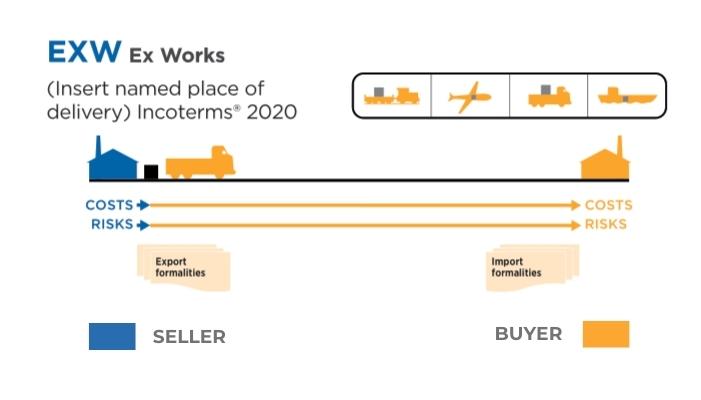
Diagram: EXW – The seller does not need to load items onto a truck or ship. The remainder of the shipment is the responsibility of the buyer (e.g., overseas shipment and customs duty). Source: ICC
Another aspect of EXW that makes life difficult is that the seller has no obligation to load the buyer’s means of transport.
It is the buyer who must arrange this, and that introduces all manner of potential problems. If the seller makes its goods available in its covered warehouse, it quite probably will be subject to various occupational health and safety regulations plus a variety of insurance implications.
It, therefore, cannot allow the buyer or its carrier to turn up with its truck, a forklift and its own staff to go rampaging through the seller’s warehouse. Even if the seller places the goods outside the doors of its warehouse at the last minute, there are likely to be similar problems with the buyer attempting to load on the seller’s grounds.
If the buyer requires extra documents such as a certificate of origin, the seller must assist the buyer, at the buyer’s request, risk and cost, to obtain it. There could be complications if the issuing authority in the seller’s country will only show a registered company in that country as the exporter/shipper/consignor because the seller is none of them.
EXW is, therefore, best kept for domestic trades where questions of export formalities, how to claim a refund of taxes and so on don’t come into the equation and where, in those rare occasions, the buyer is able to load the goods without all the local rules and regulations preventing it from doing so.
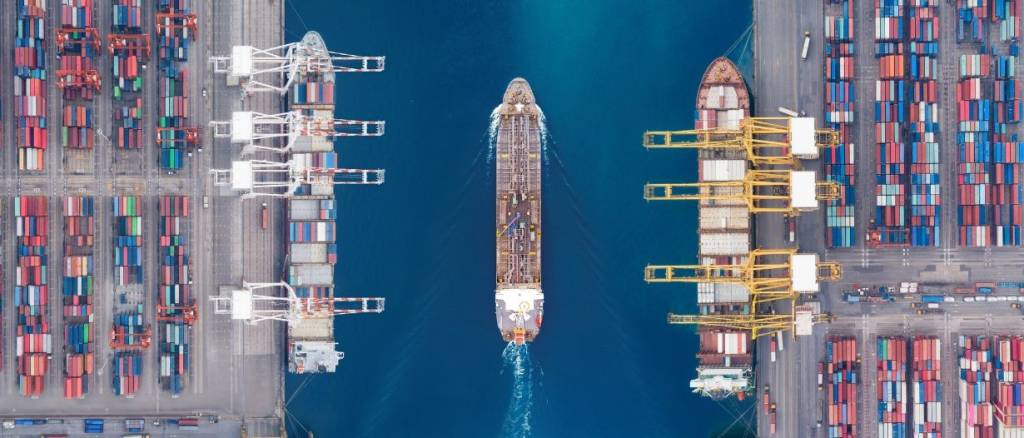
Ex Works and letters of credit
Under EXW, it is extremely difficult to arrange payment by a letter of credit (LC).
The banks typically want to see a negotiable bill of lading for sea, an air waybill for air, or a copy of a rail or road transport document as appropriate. However, under EXW, the seller is not responsible for transport and is, therefore, not entitled to receive any transport documents.
To make a workable LC, as far as the seller is concerned, the LC would need to call only for an invoice, possibly a packing list, and a copy of the buyer’s receipt (although not the original, which the seller should rightly keep). The seller has no obligation to obtain a certificate of origin, which the buyer should arrange as the exporter or carrier.
The risk to the seller is that the buyer has already received the goods, and if the seller is not familiar with LCs and makes a mistake in its documents so they are not compliant and rejected, or if the buyer or its bank are unscrupulous, they can claim a spurious discrepancy in the presented documents, refusing to pay.
In this situation, an LC is no better than an open account. In fact, it is worse because it will cost both parties in bank charges.
The transport document and any export formalities should not show the seller as an exporter or consignor, and a carrier doing this would be incorrect and make serious misrepresentations, which could come back to the detriment of the seller.
For example, if the carrier made an error in the export formalities, which was a severe breach of the export regulations, the local authorities would likely want to take action against the party declared as “the exporter”.
Further, if the buyer does not take the container from the terminal at the destination, the carrier could claim demurrage and detention from the seller if it was named as “shipper” or “consignor” on the bill of lading despite not being a party to the contract of carriage.
EXW Video – What is the importance of the new Incoterms® 2020 rules in light of Brexit?
What is the difference between Ex Works and DDP?
When the term EXW is used, the buyer is responsible for every aspect of the shipment, sometimes even including the packaging. Delivered duty paid (DDP), on the other hand, requires the seller to pay all fees along with the delivery of the goods from the seller’s warehouse all the way to the buyer’s final destination.
What is the difference between Ex Works and DAP?
Under EXW, the buyer handles every aspect of the shipment. Delivered at Place (DAP) resides on the opposite end of the Incoterms spectrum with the seller handling most of the shipment. Unlike DDP, DAP still requires the buyer to cover the cost of the import duty and taxes.
Which is better, FOB or EXW?
Neither Free on Board (FOB) nor EXW is inherently better than the other.
In fact, none of the Incoterms rules is inherently better than any other one.
They are merely a standardised way for traders to communicate and have clarity as to who is covering the costs and bearing responsibility for the various third-party components of a shipment.
Who pays freight on Ex Works?
Under Ex Works (EXW), the buyer pays for all aspects of the shipping process.
This includes loading charges, delivery to port, export duties and taxes, origin terminal charges, loading on carriage, carriage charges, destination terminal charges, delivery to destination, and import duty and taxes.
What is the difference between CIF and Ex Works?
Cost, Insurance, Freight (CIF) and Ex Works (EXW) are two of the Incoterms rules that define the various responsibilities in international commerce.
CIF is one of only two incoterms that explicitly detail which party is responsible for insurance (the other being CIP). Furthermore, while EXW can be used for any transport mode, CIF is intended for sea and inland waterway transport.
“Incoterms” is a registered trademark of the International Chamber of Commerce.
Refer to ICC publication no. 723E for the text.
Publishing Partners
- Incoterms Resources
- All Incoterms Topics
- Podcasts
- Videos
- Conferences














